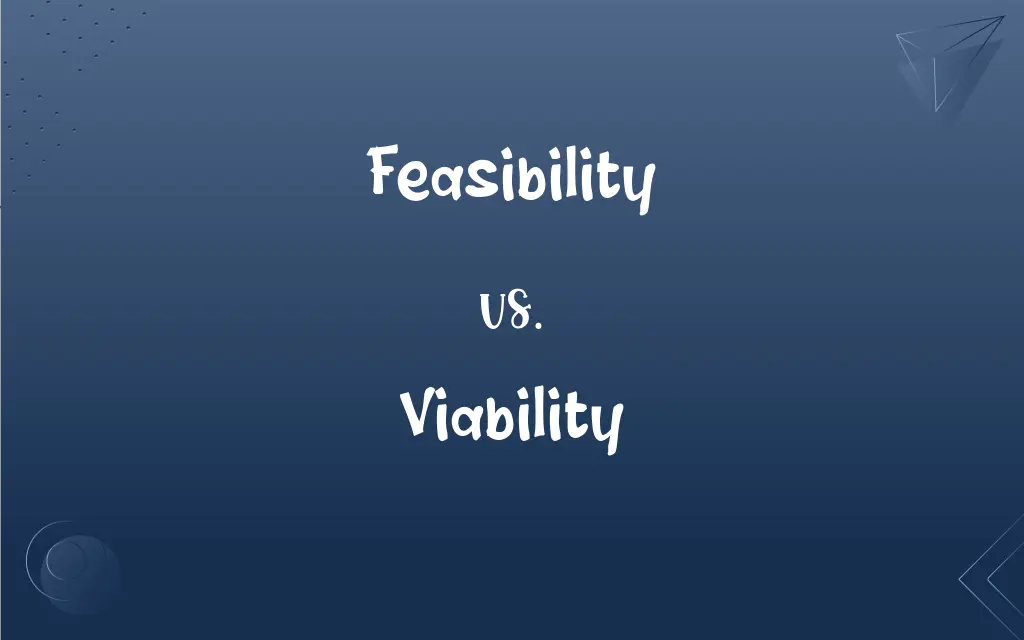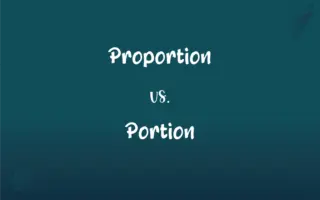Feasibility vs. Viability: What's the Difference?
Edited by Aimie Carlson || By Janet White || Updated on November 13, 2023
Feasibility assesses if something can be done, technically and legally. Viability examines if it should be done, based on long-term sustainability and profitability.

Key Differences
Feasibility refers to the practicality and possibility of a proposed project or system; it asks if the project can realistically be accomplished. Viability, on the other hand, goes a step further to analyze if the project will sustain itself in the long term, considering factors like profitability and market acceptance.
Feasibility studies often focus on the essential requirements of a project, including the availability of materials, technology, and human resources. In contrast, Viability studies are more concerned with the ongoing operational costs and the projected return on investment, ensuring the endeavor can maintain or grow its value over time.
Feasibility encompasses the investigation of legal and technical constraints facing a project, determining whether the project is achievable within these frameworks. Viability deals more with economic constraints, examining whether the project can meet its financial objectives and survive in the market.
Feasibility can also be seen as a snapshot at the starting line, clarifying whether a project is possible at the outset. Viability is the long race, contemplating the endurance of an initiative, considering market trends, competition, and financial projections.
Feasibility addresses the question, "Can we do it?" focusing on the practical aspects and immediate challenges of a project. Viability addresses the question, "Should we do it?" focusing on whether the project makes sense in the larger context and over an extended period.
ADVERTISEMENT
Comparison Chart
Focus
Possibility of initial implementation
Long-term sustainability
Study Criteria
Resources, technology, legality
Profitability, market trends, competition
Timeframe
Short-term assessment
Long-term outlook
Question Addressed
"Can we do it?"
"Should we do it?"
Risk Assessment
Technical and legal risks
Financial and market risks
ADVERTISEMENT
Feasibility and Viability Definitions
Feasibility
Feasibility concerns whether something is possible within current constraints;
The Feasibility of this technology in rural areas is questionable.
Viability
Viability is being competitive over the long term;
The Viability of our app is linked to its uniqueness in the market.
Feasibility
Feasibility involves considering legal permissibility;
The Feasibility of the construction project depends on zoning laws.
Viability
Viability means something can function economically;
The Viability of the free model is subject to advertisement revenue.
Feasibility
Feasibility requires the necessary technology be available;
We're exploring the Feasibility of integrating AI into our current system.
Viability
Viability is the ability to maintain or grow over time;
The Viability of our magazine relies on increasing subscription rates.
Feasibility
Feasibility is contingent on the availability of necessary resources;
The festival's Feasibility relies heavily on volunteer availability.
Viability
Viability involves the capacity to achieve long-term profits;
We have serious concerns about this product's Viability in a crowded market.
Feasibility
Feasibility is whether something can be done practically;
We're assessing the Feasibility of remote work for all employees.
Viability
Viability encompasses future potential and survivability;
Despite initial success, we must consider the Viability of such success continuing.
Feasibility
Capable of being accomplished or brought about; possible
A feasible plan.
Viability
Capable of success or continuing effectiveness; practicable
A viable plan.
A viable national economy.
Feasibility
Capable of being used or dealt with successfully
Feasible new sources of energy.
Viability
Capable of living, developing, or germinating under favorable conditions
Viable spores.
Feasibility
Logical; likely
A feasible explanation.
Viability
Capable of living outside the uterus. Used of a fetus or newborn.
Feasibility
The state of being feasible or possible.
Viability
The property of being viable; the ability to live or to succeed
Feasibility
The quality of being feasible; practicability; also, that which is feasible; as, before we adopt a plan, let us consider its feasibility.
Men often swallow falsities for truths, dubiosities for certainties, possibilities for feasibilities.
Viability
The quality or state of being viable.
Feasibility
The quality of being doable
Viability
The capacity of living after birth.
Viability
The capacity of living, or being distributed, over wide geographical limits; as, the viability of a species.
Viability
(of living things) capable of normal growth and development
Viability
Capable of become practical and useful
FAQs
Is a Feasibility study important?
Yes, it helps determine if a project is technically and legally possible before resources are committed.
How does market impact Viability?
Market trends, competition, and demand significantly impact a project's profitability and, hence, its Viability.
Can a project be feasible but not viable?
Yes, a project might be possible to initiate (Feasible) but may not be sustainable or profitable in the long term (Viable).
Why consider Viability?
To ensure the project can sustain itself, meet market demands, and be profitable over time.
What's a Viability study?
An analysis to determine if a business idea can sustain itself and be profitable in the long term.
Can Feasibility change over time?
Yes, as technology, laws, and resources evolve, the Feasibility of a project can change.
Do startups need Viability analysis?
Absolutely, to understand if their business model can survive and thrive in competitive markets.
How detailed should a Feasibility report be?
It should cover all essential aspects, including resources, technology, and legality, with enough detail to inform a decision.
Are Feasibility and Viability the same?
No, Feasibility assesses if something is possible, while Viability evaluates its long-term sustainability and profitability.
Who conducts Feasibility studies?
Experts with technical and legal knowledge relevant to the project, often third-party consultants.
How do investors use Viability studies?
To decide whether a business or project is worth investing in based on its long-term profitability.
What factors affect Feasibility?
Resource availability, technical constraints, and legal regulations primarily affect Feasibility.
Can Viability affect a brand's reputation?
Yes, a product's success or failure in the market can impact consumer perception and brand reputation.
Is Viability only about financial success?
Primarily, but it also considers other factors like market acceptance and competitive endurance.
Can Feasibility studies predict future obstacles?
They identify potential risks and bottlenecks at the project's outset, though not all future challenges.
When should Feasibility be assessed?
Before a project starts, to avoid investing in a project that's not possible technically or legally.
What's a technical Feasibility study?
It assesses whether the necessary technology and expertise are available to complete a project.
What if a Viability study results are negative?
It suggests re-evaluating the business model, strategy, or potentially abandoning the project to avoid future losses.
Are Feasibility studies expensive?
They can be, depending on the project's complexity, but they're valuable for informed decision-making.
Does Viability consider environmental impact?
It should, as environmental sustainability can influence a project's long-term success and social acceptance.
About Author
Written by
Janet WhiteJanet White has been an esteemed writer and blogger for Difference Wiki. Holding a Master's degree in Science and Medical Journalism from the prestigious Boston University, she has consistently demonstrated her expertise and passion for her field. When she's not immersed in her work, Janet relishes her time exercising, delving into a good book, and cherishing moments with friends and family.
Edited by
Aimie CarlsonAimie Carlson, holding a master's degree in English literature, is a fervent English language enthusiast. She lends her writing talents to Difference Wiki, a prominent website that specializes in comparisons, offering readers insightful analyses that both captivate and inform.







































































